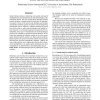Free Online Productivity Tools
i2Speak
i2Symbol
i2OCR
iTex2Img
iWeb2Print
iWeb2Shot
i2Type
iPdf2Split
iPdf2Merge
i2Bopomofo
i2Arabic
i2Style
i2Image
i2PDF
iLatex2Rtf
Sci2ools
INTERSPEECH
2010
2010
Manipulating treacheoesophageal speech
Speech therapy aiming at improving voice quality and speech intelligibility is often hampered by the lack of knowledge of the underlying deficits. One way to help speech therapists treating patients would be to supply synthetic benchmarks for pathological speech. These can be used to train therapists and evaluate and interpret automatic speech recognizers used for diagnosing pathological speech. Moreover, synthetic pathological speech can also be used to make expected therapy aims audible before treatment. In a listening experiment testing perceived intelligibility, three types of manipulations of tracheoesophageal speech were evaluated by experienced speech therapists. It was found that modeling the intensity contour of the voice source signal improved speech quality over plain analysis-synthesis. Replacing the voicing source with fully synthetic source periods decreased the perceived intelligibility markedly. Making the source fully periodic with a regular pitch had no effect on per...
INTERSPEECH 2010 | Pathological Speech | Quality Speech | Signal Processing | Synthetic Pathological Speech |
| Added | 18 May 2011 |
| Updated | 18 May 2011 |
| Type | Journal |
| Year | 2010 |
| Where | INTERSPEECH |
| Authors | R. J. J. H. van Son, Irene Jacobi, Frans Hilgers |
Comments (0)

